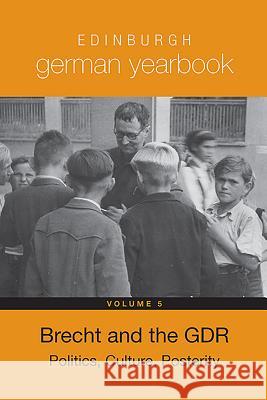Edinburgh German Yearbook 5: Brecht and the Gdr: Politics, Culture, Posterity » książka
Edinburgh German Yearbook 5: Brecht and the Gdr: Politics, Culture, Posterity
ISBN-13: 9781571134929 / Angielski / Twarda / 2011 / 250 str.
The avant-garde writer and director Bertolt Brecht left the West for good in 1949, returning to East Berlin and founding the Berliner Ensemble. While he quickly became identified internationally as the cultural figurehead of the young socialist state, his relationship with the authorities was always complex, and he was increasingly marginalized by restrictive and authoritarian structures of power. It was only after his death that the regime sought to elevate him as a socialist classic - a shift that entailed the selective appropriation of his legacy and the development of authorized modes of interpretation and performance. Poets, theorists, dramatists, and directors soon reacted against what they saw as the stagnation of Brecht's critical impetus: they began to subject his work to his own treatment, using his texts as a source of material and taking his methods to more radical conclusions. EGYB 5 explores the multiple, contradictory impulses behind these broad paradigm shifts and behind Brecht's activities in the GDR. It investigates the tensions engendered by his co-option as a socialist classic, and the range of creative responses his works have inspired, both in the GDR itself and in reaction to its demise. Contributors: David Barnett, Laura Bradley, Joy Calico, Paula Hanssen, Patrick Harkin, Loren Kruger, Karen Leeder, Moray McGowan, Stephen Parker, David Robb, Erdmut Wizisla. Laura Bradley is Senior Lecturer in German at the University of Edinburgh. Karen Leeder is Professor of Modern German Literature and a Fellow of New College, University of Oxford.











